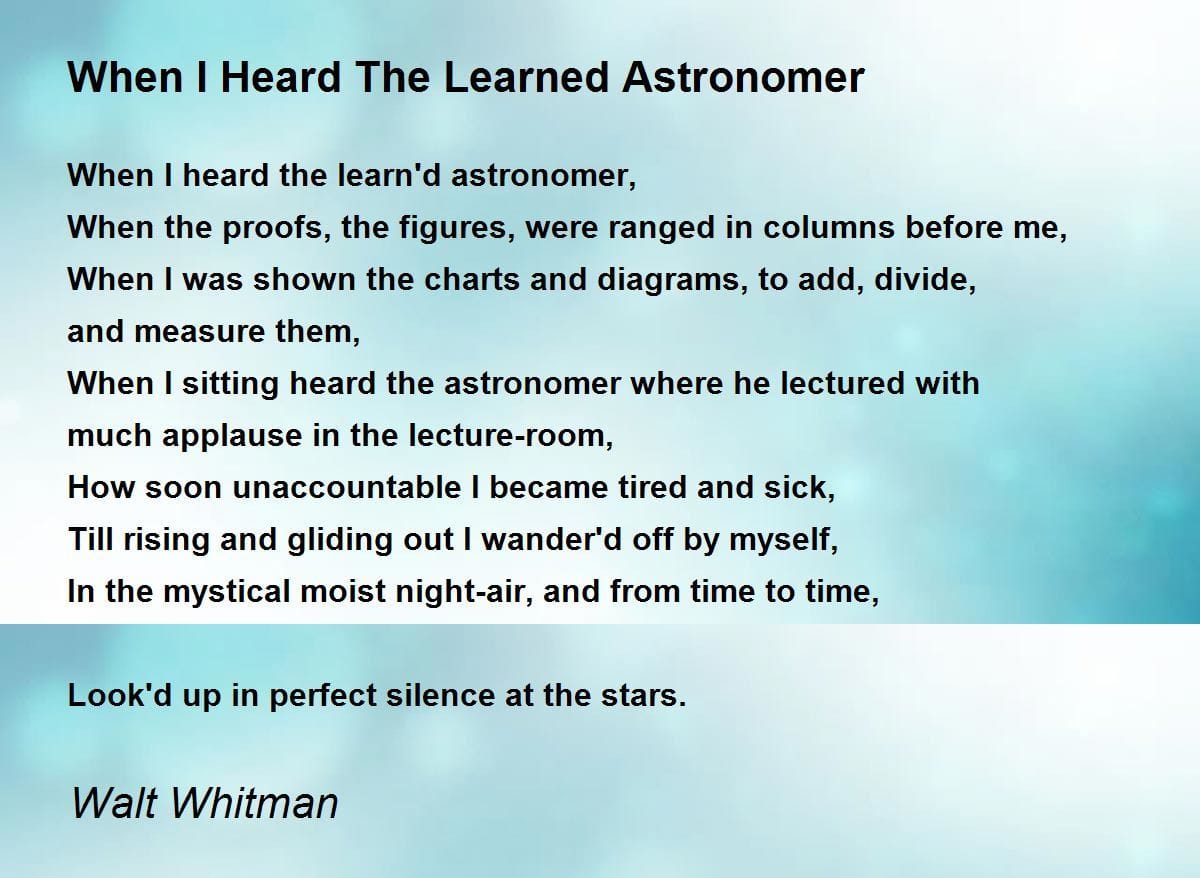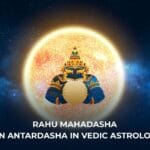Imagine this: you’re seated in a packed lecture hall, diligently absorbing an astronomer’s detailed presentation about the cosmos. Facts and figures wash over you – the sheer scale of the universe, the intricate dance of celestial bodies. But as the lecture progresses, a peculiar feeling emerges. You find yourself becoming “tired and sick,” as if the raw data, however fascinating, can’t quite capture the awe-inspiring essence of the stars themselves. This, in essence, is the journey that Walt Whitman invites us to take in his evocative poem, “When I Heard the Learn’d Astronomer.”
## Beyond the Lecture Hall: Experiencing the Cosmos
Published in 1865, “When I Heard the Learn’d Astronomer” isn’t simply a poem about stars; it’s a timeless exploration of how we connect with the world around us, particularly the profound ways in which direct experience can illuminate what intellectual analysis alone cannot.
The poem opens with the speaker feeling overwhelmed by the astronomer’s data-driven lecture, bombarded with “proofs,” “figures,” and “charts.” This intellectual approach, while initially captivating, leaves the speaker feeling strangely empty. It’s only when he escapes the confines of the lecture hall and steps out into the “mystic moist night-air” that a profound shift occurs.
## Finding Solace Under the Stars: The Power of Direct Experience
Standing alone beneath the vast expanse of the night sky, enveloped in “perfect silence,” the speaker experiences a powerful transformation. The information overload dissipates, replaced by a sense of awe and tranquility. It’s in this moment of quiet observation, of allowing himself to be fully present with the cosmos, that the speaker finds a deeper, more profound understanding than any lecture could provide.
This, perhaps, is Whitman’s most potent message: sometimes, the most meaningful truths reveal themselves not through textbooks or lectures, but through direct, personal engagement with the world around us. While science offers invaluable insights, it’s essential to recognize that some experiences transcend data and formulas.
## A Timeless Message for the Modern Age
Written in the midst of the 19th-century’s scientific and technological revolution, “When I Heard the Learn’d Astronomer” carries a message that feels strikingly relevant today. In our age of constant information flow, it’s easy to feel overwhelmed, to seek solace in facts and figures while overlooking the importance of direct experience.
Whitman encourages us to resist this tendency, to step away from our screens and engage with the natural world. Whether it’s gazing at the stars, listening to the wind rustling through the trees, or simply feeling the earth beneath our feet, these moments of mindful connection can offer a sense of peace, wonder, and belonging that transcends the limits of intellectual understanding.
## Key Themes and Interpretations
To fully appreciate the depth of Whitman’s poem, let’s explore some of its key themes and potential interpretations:
* **The Limits of Science:** While not anti-science, Whitman challenges the idea that scientific knowledge alone can fully encompass the wonders of the universe. Some truths, he suggests, are better felt than measured.
* **The Importance of Personal Experience:** The poem champions direct, personal engagement with nature as essential for true understanding and spiritual fulfillment. It’s one thing to know about the stars, and quite another to stand beneath them, humbled by their vastness.
* **The Emotional Response to Nature:** Whitman emphasizes the powerful emotions – awe, wonder, tranquility – that nature evokes, contrasting them with the primarily intellectual response to scientific data.
* **Transcendentalist Influences:** Though not strictly a Transcendentalist, Whitman shared their belief in the inherent goodness of humanity and nature, as well as the importance of intuition and experience in understanding the universe.
## Unlocking Deeper Meaning
To further enhance your understanding of “When I Heard the Learn’d Astronomer,” consider these additional points:
* **The Role of Silence:** The speaker’s transformative experience occurs in “perfect silence,” suggesting that quieting the mind and opening oneself to the present moment can be more powerful than intellectual analysis.
* **The Astronomer’s Perspective:** It’s worth considering that the astronomer, while representing a data-driven approach, likely possesses a deep appreciation for the cosmos. Science and emotional wonder aren’t mutually exclusive.
* **A Call to Action:** Whitman’s poem can be interpreted as a call to action for readers to cultivate a more direct relationship with nature. By slowing down, observing, and allowing ourselves to feel awe and wonder, we can tap into a deeper level of understanding and connection.
Expand your knowledge and delve into the meaning of “in excelsis deo” by clicking [here](https://www.lolaapp.com/what-does-in-excelsis-deo-mean).
- Unlocking Francis Alexander Shields’ Finance Empire: A Comprehensive Biography - July 12, 2025
- Unveiling Francis Alexander Shields: A Business Legacy - July 12, 2025
- Francis Alexander Shields’ Business Career: A Comprehensive Overview - July 12, 2025
















1 thought on “Walt Whitman’s When I Heard the Learn’d Astronomer: A Timeless Message in the Age of Science”
Comments are closed.